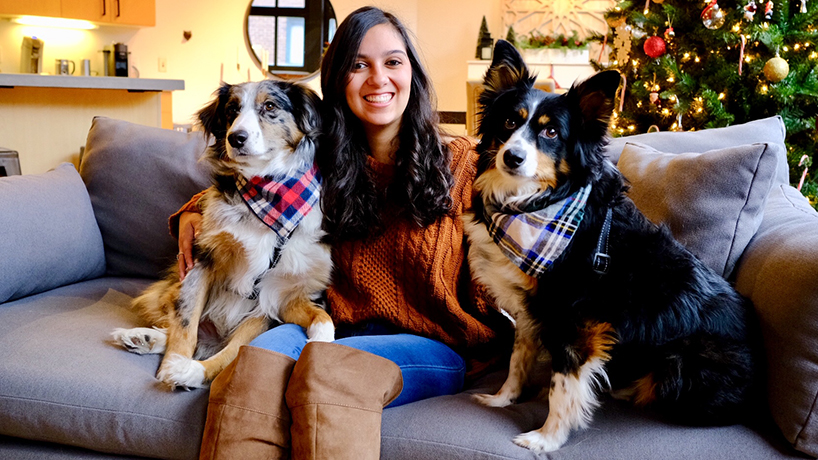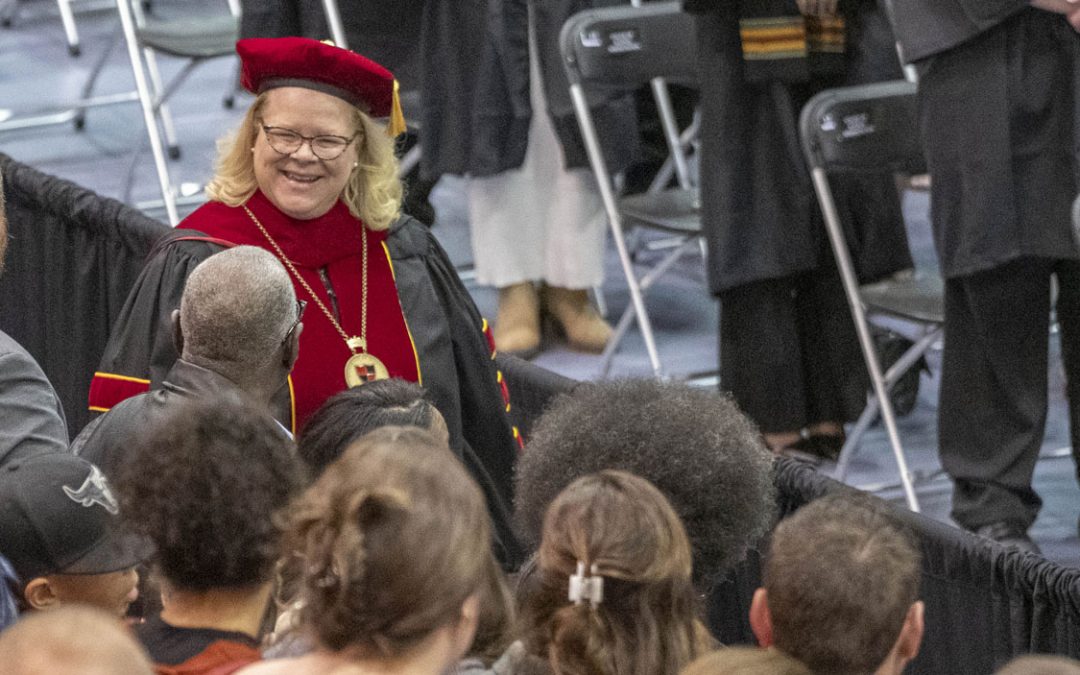
BSN student Lesley Colonia extinguished a fire in her neighbors’ unit, saving Goose (left) and Maverick (right). (Photo by August Jennewein)
Lesley Colonia spotted the blaze the minute she opened her neighbor’s door. Thanks to the loft’s open layout, the University of Missouri–St. Louis College of Nursing student had a clear line of sight into the apartment where a fire burned atop the kitchen island.
Colonia’s mind went blank. Then it snapped on.
There was a fire extinguisher in her unit.
“I automatically ran to my apartment to get that because I knew where it was,” she said, recalling the P.A.S.S. – pull, aim, squeeze, sweep – technique taught during hospital orientations.
Her evening, Dec. 1, had started innocuously. After returning from a shift as a student nurse aide, she noticed a persistent musical sound coming from the adjacent unit, home to Kayla Wingbermuehle-Brown and Mike Brown and their two dogs. Colonia started thinking it sounded strange and knocked on the wall dividing their apartments, then went into the hallway, where the noise coalesced into an alarm.
The Browns’ dogs, normally barkers, were concerningly silent, and Colonia couldn’t reach her neighbors by phone. The Browns’ alarm panel started reading “smoke detected,” and Colonia called 911. She was on her way to meet the fire department downstairs when Kayla called with the keypad code. Maybe if Colonia opened the door, the dogs would run out.
Instead, Colonia extinguished the fire herself, saving the Browns’ loft and pets and preventing the fire from spreading to other units. Colonia believes her nurse training empowered her reaction and that frequent fire extinguisher instruction at work informed her actions.
“I didn’t even really think,” Colonia said. “I went into survival mode. I was just like, ‘Oh my god, what do I need to do to stop this?’”
After the fire was out, Colonia found the dogs hiding upstairs, but they were too traumatized to be coaxed out by a stranger. Worried about their smoke inhalation, she went around opening windows while another neighbor reworked the fire extinguisher over the charred island.
“I have to tell you that there is nothing scarier than seeing a bunch of fire trucks outside and knowing it’s your unit that is on fire,” Wingbermuehle-Brown said. “Lesley is just an incredible human. She’s very humble and kind, and she’s the best neighbor we could ever hope for. The thing that strikes me is that she keeps saying, ‘Oh, I did what anybody else would have done.’ I can’t imagine anyone else who have knowingly opened up the door and walked into a unit was filled with smoke, not knowing how big the fire was going to be. That would run into that situation and not only try to save the animals inside but also take it upon herself to put out the fire.”
The fire turned out to have been started by the dogs, who had compressed a knob on the gas range. Shaken, the Browns have further dog-proofed their home and installed knob locks on their stove.
Colonia said the experience changed her, making her more aware of her surroundings.
“This is my first time living on my own completely,” Colonia said. “It helped me really realize that I can kind of handle things.”
Though Colonia didn’t feel fear during the fire, the events of the evening got to her later.
“I was definitely afraid after, when I had time to think about everything I just went through,” she said. “After I got home, I didn’t sleep because now I could possibly die from smoke inhalation because I was in the apartment for quite some time. When I came home I showered and blew my nose, and every time I blew my nose it came out black. Then I couldn’t sleep, and I had work the next day. As soon as I walked in, I checked my oxygen and had the nurse listen to my lungs.”
Her lungs were cleared by a nurse at Missouri Baptist Medical Center in St. Louis, where Colonia works as a student nurse aide in the general medicine unit. Over winter break, she also completed an internship at SSM Health DePaul Hospital. Though it was “a little hectic,” she pulled through, thinking about her parents’ work ethic while doing so.
Both of Colonia’s parents are from Colombia and immigrated to the United States at 19 years old. They strived ferociously to give Colonia and her brother good lives and, in doing so, inspired her to try do the same for her future children.
“I’ve learned a lot from them,” she said. “They really started off with nothing and worked their way up. I wish that I could give way more back to them because I just want to see them retire and relax on beach or something.”
She’s enjoyed studying for her BSN at UMSL and hopes to become a pediatric nurse after graduating in the spring. Previously, she’d earned a bachelor’s in psychology in Texas before deciding she wanted a more hands-on career.
“I felt nursing was the best thing because you’re really there for your patients,” she said. “You see them 12 hours straight. You help them through some really difficult times, but you’re also there for some really good times.”
She’d worked at a mental health crisis line for her psychology degree but didn’t like her inability to follow up with patients. Though Colonia considered becoming a physician assistant, she reconsidered after thinking about how she’d felt caring for her diabetic grandmother while growing up.
“I think deep down I might have known all along,” she said, “I loved caring for her. I saw how friendly and hands on the nurses were and how they always had smiling faces. They were just so helpful, especially since she didn’t speak any English at all, but that didn’t matter. Just seeing how people treated her so well really made me believe that this is a profession that I wanted to do. I wanted to do the same for someone else.”














